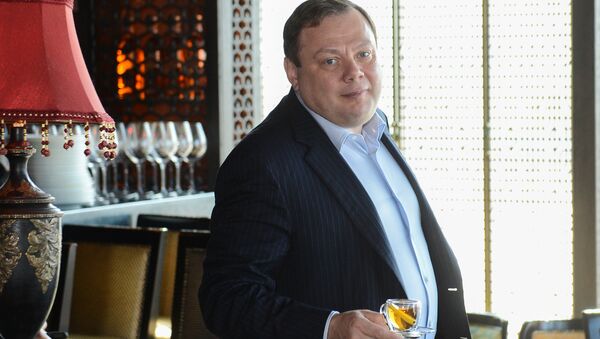TOP PICK: From window cleaner to CEO of Alfa bank. We chart the fascinating journey of oligargh Mikhail Fridmanhttps://t.co/2Qe6kbyZrD pic.twitter.com/wDw1LbBZCV
— bne IntelliNews (@bneintellinews) 13 May 2017
Mr. Fridman is not well-known in Britain but, according to Forbes, he is the seventh richest man in Russia, with a worth of US$14.4 billion.
Last year he invested US$50 million in US telecommunications start-up FreedomPop.
The 53-year-old billionaire is now based in London, but he has a majority shareholding in Russia's second biggest food retailer, X5, controls Alfa Bank and Russia's third-biggest mobile operator Vimpelcom.
He sold oil company TNK-BP to Russia's state-owned energy group Rosneft in 2013 and has largely been investing outside Russia.
His company, Letter One Holdings, is now investing in the UK under the umbrella of L1 Retail.
Holland & Barrett, a chain of health food shops which dates back to 1870, was bought in 2010 by the US hedge fund The Carlyle Group, who also own the far bigger US chain, Nature's Bounty.
Holland & Barrett has been sold for £1.8 Bn. That's nuts! Did you seed what I did there?
— Lee Hurst (@2010LeeHurst) 26 June 2017
L1's purchase of Holland & Barrett is expected to be formalized by September.
Industry experts think the health food market will continue to flourish and that may explain why Amazon recently purchased Whole Foods — which also has outlets in Britain — for US$13.7 billion earlier this month.
Euromonitor say the health and wellness market grew by 4.8 percent a year between 2011 and 2016, reaching a total global value of US$704 billion last year.
Holland & Barrett's success dates back to 1920 when Samuel Ryder — who also sponsored the famous golf tournament — set up a company specializing in herbs.
In the 1960s and 1970s it surfed the rising popularity of organic foods and was one of the first shops to start stocking muesli.
Nowadays its products range from vitamins for pregnant women, homeopathic remedies to gluten- and allergy-free foods and proteins for bodybuilders.
Its sales have grown for 32 consecutive quarters, with revenues topping £610 million (US$777 million) in 2016.
They have more than 1,000 stores in Britain as well as an online empire and are planning to expand overseas.
..Like so many other 'British institutions' who have been sold down the river for the sake of a fast buck to the detriment of ethics.
— Mrs M🌱 (@TheMorganics) 26 June 2017
"We believe that the company is well positioned to benefit from structural growth in the… health and wellness market and has multiple levers for long term growth and value creation," L1 Retail's managing partner Stephen DuCharme said.
The Carlyle Group is also planning to sell off Nature's Bounty, which produces similar goods in the US and Canada.
"Initially I liked Holland & Barrett as they were the first I'd come across in the 1980s that offered vegetarian and vegan-friendly products before the supermarkets caught up. I still rely on them for niche products that supermarkets don't offer," said Julie Roberts, who lives in the Midlands, UK.
"But since the buy-out in 2010 their products have become increasingly expensive unless you take up their penny sale or 'buy one and get one half price' deals, but I don't always want to make multiple purchases as things go off or past their use-by date by the time I actually want to use them," Ms. Roberts told Sputnik.
"I have concerns about the new owner's oil and gas interests. This doesn't chime well with a store whose customers are more likely to have 'green' interests.
"We are becoming less and less able to make ethical choices when financial organizations buy up stores like this," she told Sputnik.



